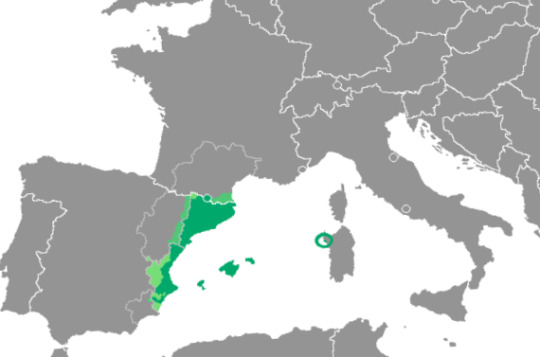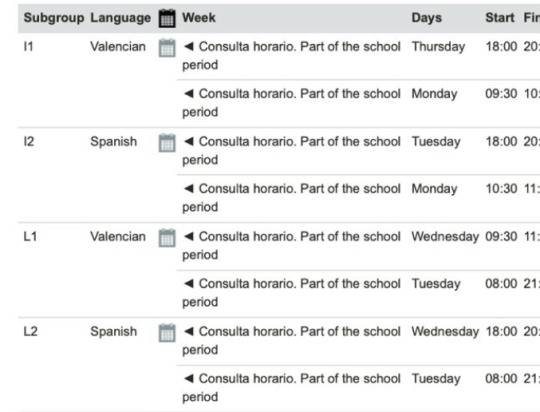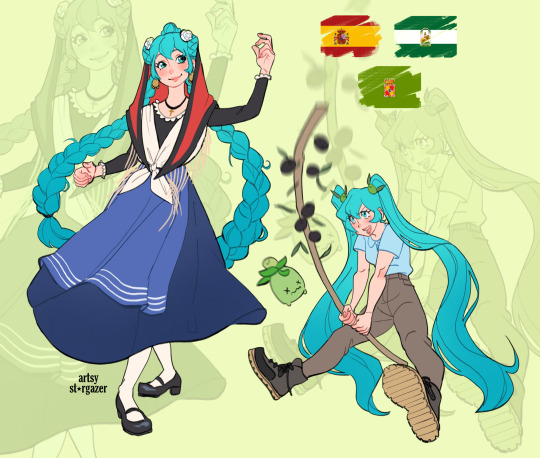#valencian
Explore tagged Tumblr posts
Text

For comparison, the map of geolocated Wikimedia elements vs map of the Catalan Countries:

Catalan was the 3rd Wikipedia to be created (after English and German) but, even though German Wikipedia website had been created, it didn't have any articles for a while. For this reason, Catalan Wikipedia was the 2nd Wikipedia in the world with articles.
Since its creation in 2001, the Catalan community has been one of the most active Wikipedia communities in the world with the objective of making reliable information in our language freely available to anyone. In 2010, the Catalan Wikipedia became the first version of Wikipedia to rank high quality in all the articles of Wikipedia’s List of Articles All Languages Should Have, reaching this milestone even before English. It has also been awarded many other times for its high quality articles.
Thank you to everyone who contributes!
#wikipedia#catalan#viquipèdia#català#internet#valencià#valencian#wikimedia commons#open source#digital volunteering
3K notes
·
View notes
Text
📢 14 municipis del País Valencià i vora 100 de l'Estat tornem als carrers aquest cap de setmana en una altra jornada històrica en suport a 🇵🇸❗
➡️ Aturem el genocidi a Palestina, fi al comerç d'armes i a les relacions amb Israel
📥 Si ets del País Valencià, descarrega't els cartells de les convocatòries ací i empapela els teus territoris: https://linktr.ee/BDSPaisValencia
📢 14 municipalities in the Valencian Country and around 100 in the State are back on the streets this weekend in another historic day in support of 🇵🇸❗
➡️ Stop the genocide in Palestine, end the arms trade and relations with Israel
📥 If you are from the Valencian Country, download the posters for the calls here and wallpaper your territories: https://linktr.ee/BDSPaisValencia


@antifainternational @anarchistmemecollective @kropotkindersurprise @radicalgraff
#StopArmasConIsrael#bds#MunicipiosConPalestina#Valencian Country#valencian community#valencian#signal boost#signal b00st#signal boooooost#free palestine#palestine#freepalastine🇵🇸#gazaunderattack#gaza genocide#gaza strip#free gaza#gaza#genocide#no pride in genocide#environmental activism#activism#activist#organise#organize#boycott israel#anti israel#israhell#israel#anti netanyahu#fuck netanyahu
85 notes
·
View notes
Text
'Valencian boats, 1908' by Joaquin Sorolla

3 notes
·
View notes
Text
*also known as català, valencià, Valencian
reblogs are extremely encouraged to increase sample size. regardless of what choice you picked, feel free to elaborate on your relationship with this language in the tags, and remember to be respectful and mindful when commenting!
19 notes
·
View notes
Text
2 notes
·
View notes
Text
please please help
Anyone on this website study in Valencia?
Are the courses (in biology) split into Spanish and Valencian?

Meaning that L1 and L2 for example have the same stuff they teach, just in different languages?
#Valencia#universidad Valencia#Universidad#spanish#español#valencian#comunidad valenciana#valencian community#op dasloddl#Spanish stuff#uv.es#University valencia#Studyblr#spanishblr#España#catalunya
2 notes
·
View notes
Note
worst part is remnants of the civil war are still here. i was raised in catalonia and in my school we were taught every subject in catalan. i was from valencia but my parents are argentinian, and the four years i spent in valencia before moving in catalonia taught me no valencian (dialect of catalan). so in catalonia, my teachers would tell 5 y.o. me to try to speak catalan and to not speak spanish, and even told my parents to not speak spanish at home. i ended up being top of my class, and catalan was easy for me during the next years. i never spoke catalan at home, but it was fine, some friends of mine didn’t even speak spanish.
we moved back to valencia when i was about to turn 9 though. i hated school here. even though i was on the valencian line (your parents can choose wether their kids study most subjects on valencian or in spanish) the teachers really didnt put much effort into it, and while the textbooks were in valencian, they taught the class in spanish. i was bullied by my classmates for my catalan accent too. catalan is seen as this left-wing propaganda shit, and in valencia we’re raised to hate catalonia by the ‘fachas’ (fascists). in reality, i got to grew up in a beautiful place surrounded by beautiful people and a beautiful culture. even in high school, i still was the best at valencian in my class, because of the inmersion i had gotten years ago in it. the teachers would tease about me using certain vocabulary, but they found that enriching, so there’s that. i still hear hateful things about catalonia and catalan and valencian left and right, well, mostly right. and now theres a new law where theyll allow high schoolers to learn subjects only in Spanish (the lines had only been applied in elementary schools before) so fuck. i dream of moving back to catalonia when i can, but while im here, ill fight for my language and my dialect.
you mentioned that it was beaten into your grandparents' generation to not speak catalan, but to speak spanish. did people in catalonia often not speak spanish before franco? what was the political situation of the language like before?
also, do catalan people prefer when spanish is called castellano? i know in romance linguistics it's often called that because spain has other languages, but i think catalan people often don't consider themselves spanish if i've understood it correctly
Yes, many people did not speak Spanish before Franco. For example, my grandma was born and raised in Barcelona right before the war (she was born in 1932) and she did not know any Spanish when she was a kid. She told me that one of the things she remembers the most of her childhood is how terrified she was that someone would find that out. She used to go with other kids of the street to sew with a elderly woman while their parents were at work (babysitting in working class neighbourhoods basically) and after Franco won the war this woman (who didn't speak Spanish either) told them in a made-up Spanish (adding an -o at the end of Catalan words and making them "sound Spanish" mixed with the very little Spanish she knew) that now it was very important that they all spoke Spanish when someone could hear because otherwise they could go to jail. So my grandma spent about a year when she did not say a single word on the street or outside of her family and close family friends. When she went to the market, she only pointed at things and nodded yes or no with her head or said the numbers by raising her fingers. She was very scared that she would be jailed with murderers and rapists. Even though I don't think children would be jailed for this (but it's not strange she believed it, because she had relatives who were in jail and were tortured, and the first years of dictatorship there was so much torture, executions and depravity that you ended up believing anything could happen), even if children wouldn't be jailed, they could still have gotten punished. She was still a kid, so at that age you learn quickly, so she could learn Spanish soon enough (or at least enough Spanish to pass well, because to be fair I've heard her speak Spanish now and every so often she still makes noticeable mistakes, even after decades of being married to my grandpa who is Spanish and speaking Spanish at home).
My parents (born in the 1960s), too, have told me that some of their classmates made mistakes and used Catalan words instead of the correct Spanish sentence. At that point, pretty much everyone in urban areas like ours already spoke Spanish well enough, but most people didn't use it often outside of school (unless they were Spanish immigrants or their children), so they made mistakes. And then the teacher beat them. It was the law that the punishment for speaking Catalan (and for many other things) in schools was corporal punishment. My mum was never beaten and was always at the top of the class and well-behaved, but even to this day she is still quite traumatized for what she saw. The only time I have seen her cry very desperately almost like an anxiety attack was when my grandma was talking about their teacher, because she remembers how he used to throw disobeying children to the floor and kick them, even when the kids were crying he'd still continue kicking them.
My parents have still met quite a few elderly people who didn't speak Spanish, only Catalan or Aranese (there was an Aranese man who used to come to my town for commerce, but it's no problem because Aranese and Catalan are mutually understandable, so they could have conversations where he spoke Aranese and the others spoke Catalan and it was fine, they just thought it was kind of funny). But I (and I dare to say almost everyone from my generation, except people who know someone with a strong mental disability and maybe some people from very rural areas) have not met anyone who speaks only Catalan and doesn't speak Spanish (excluding people from the Catalan-speaking areas that aren't under Spanish control, of course; because I have some friends from Northern Catalonia and there the bilingualism is Catalan+French, or even only French at this point for many young people).
You asked what the political situation of the Catalan language was before the fascists' victory in the Civil War. The situation was of course much better than during Francoism, for example we had the right to use Catalan in public, in schools (public schools taught in Catalan and even taught how to write Catalan), there were films dubbed to Catalan, Catalan radio, Catalan books, etc. and the huge amount of people in Catalonia spoke only Catalan in their everyday lives. However, there was still a strong political and social discrimination according to which Catalan was associated with the working classes and Spanish was seen as more classy (this was the case since the 1600s and intensified much more after 1714), but thanks to the Renaixença movement* Catalan had regained prestige to be used in literature and formal settings, even of the upper class, though conservative upper class (specially monarchists and fascists) still preferred Spanish. But we had done a lot of great steps in the right direction, and things were going very well. Better than ever before since Spain's invasion in 1714.
*the Renaixença was an artistic —and most important literary— movement of the 1800s that's basically our version of Romanticism but with a strong component of political and social fight for the rights of Catalan language and people.
I do not have any preference on whether Spanish should be called Spanish (español) or Castillian (castellano). In Spain, it's almost always called Castillian, so when I speak in Spanish I say castellano just because that's what I'm used to. But it's the same. It feels more correct to say Castillian because it's the language of Castilla, like you say "English" because it's the language of England (instead of saying "British"). But Spain is just Castilla and the lands it invaded, so when anyone says Spanish (language, culture, government, whatever) it means the Castillian one, and Spain has worked hard to make it clear that it does not include any of the occupied nations in its concept of country. So I always understand Spanish as referring exclusively to Castillian things (understanding Castilla to include all the Kingdom of Castilla, not only the modern-day administrative regions of Castilla. So, for example, including Andalucía and Extremadura).
I do not consider myself Spanish and I find it offensive when people try to say "Catalan is also Spanish because it's a language from Spain", it feels like saying that Catalan is nothing of itself, only belonging to Spain. It's forgetting that part of Catalonia has never been Spain (Northern Catalonia) and that Catalan is also the language of Andorra (an independent nation) and l'Alguer (a city in Sardinia inhabited by the descendants of Medieval Catalan settlers who moved there centuries before Catalonia was occupied by Spain). Their language is not "a Spanish language" and never has been, and either way I refuse to be reduced to that. Our language goes back centuries (with changes over time, of course, but it hasn't changed as much as English, we can read Late Medieval Catalan just fine), it has developed as independently as any other Romance language, with its own traditions and literature (the 1st vernacular literature in Romance languages btw!), so we are of ourselves, not "of Spain". I don't want our existence to be reduced to a possession of Spain. We should be described in our own terms.
So yeah, in Spanish saying both castellano and español are fine (some Spanish-speaking countries use one more or the other more), and in English I think it's better to just say Spanish, because that's the word that's used in English. But I don't really mind tbh.
I hope that answers your questions :)
203 notes
·
View notes
Text

Andalusian Miku (from Jaén)
no Smolivs were harmed during the making of this piece
#hatsune miku#i love this trend but decided against making her valencian because several people had already made fallera mikus#plus no one was going to draw anything jaén related let's be real#biel's art
580 notes
·
View notes
Text

Josep Benlliure i Gil (Spanish, 1855-1937)
El jardí de l’autor
827 notes
·
View notes
Text

Colonia Santa Isabel, Sant Vicent del Raspeig, Alicante, Valencian Community.
152 notes
·
View notes
Text
A day in the life of someone who posts on the internet in Catalan *cue dozens of Spanish people asking "what's wrong with your mouth", ordering him to speak in Spanish or "in Christian", saying he's rude for speaking in Catalan, calling him "polaco" (derogatory Spanish word to mean a Catalan person), calling the Catalan language a dialect, saying he is possessed because he's speaking Catalan, etc*
This is a video by Sergi Mas showing some of the comments he gets on YouTube. He makes videos about mountain biking that he posts on YouTube, TikTok, and Instagram. And the first comment he got on his first YouTube video was already someone telling him he should do it in Spanish.
Some days ago, another creator who posts his videos in Catalan (Joan Sendra, find him on Instagram and TikTok) answered to a Spanish person who was complaining that it's rude to speak Catalan/Valencian on the internet instead of Spanish because then there's people who don't understand you (as if everyone in the world spoke Spanish lmao). Joan, who is tired of getting this kind of comments so often, answered: there are already endless videos and things to watch on the internet in Spanish. In fact, if you look for [the topic he was talking about in the video that this guy commented] all the videos are in Spanish except for mine. And yet you had to come to me, the one in Valencian, and tell me that I can't make a video in my language and that I can only make it in yours. If you don't like it, it's so easy to find another one!
However, it's not a matter of actually being interested in what's being said in a language they don't speak. It's about the imposition of the language they consider superior (Spanish) and telling speakers of the languages whose land Spain had occupied that they are useless and should be ashamed of existing in public. Well, we aren't. Like Sergi's video, don't let the comments disturb your macarrons.
#català#valencià#actualitat#languages#language#catalan#cultures#valencian#diversity#minoritized languages#imperialism#influencers#sociolinguistics#minority languages
1K notes
·
View notes
Text


i once again have regionally/vaguely historically referenced a crown of candy 🤲🧎
#dimension 20#d20 fanart#a crown of candy#acoc fanart#jet rocks#ruby rocks#primsy coldbottle#plumbeline uvano#ofc french rococo for the candians bc the more i would look at caramelindas clothes the more i think they look like a robe a la francaise#which ofc just makes sense#baroque for miss coldbottle with a mix of valencian lace veils#and then an indian saree for plumbeline just bc fructera makes me think of south asia and south east asia…#myart
115 notes
·
View notes
Text

Title: Guardian Angel Artist: Joan de Joanes (born Vicente Juan Masip; Spanish, 1507-1579) Date: mid-16th century Genre: religious art (Roman Catholic Christianity) Period: Spanish Renaissance Movement: Valencian School Medium: oil on panel Dimensions: 95.5 cm (37.5 cm) high x 75.5 cm (29.7 in) wide Location: Museu Catedralici Diocesà de València, Spain
#art#art history#Joan de Joanes#Juan de Juanes#Vicente Juan Masip#religious art#Christian art#Christianity#Catholicism#angel#angels#Spanish Renaissance#Spanish Golden Age#Siglo de Oro#Valencian School#Spanish art#16th century art#oil on panel#Museu Catedralici Diocesà de València
139 notes
·
View notes
Text

Eglise Saint Nicolas et Saint Pierre, Valencia, Spain: San Nicolás de Bari and San Pedro Mártir is a Valencian Gothic style, Roman Catholic parish church located in Valencia. Wikipedia
#San Nicolás#Eglise Saint Nicolas et Saint Pierre#Valencian Gothic#Catholic Church#Valencia#Spain#europe
172 notes
·
View notes



